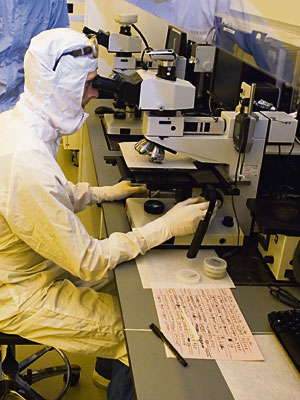Biofab
Today, a single designer microbe can take years to create and can cost tens of millions of euros, since each control element must be identified, characterised and tweaked in order to be reused.
Enter Biofab: International Open Facility Advancing Biotechnology (Biofab), which aims to produce thousands of free, standardised DNA parts to shorten the development time and lower the costs of synthetic biology.
One of the founders of Biofab, microbiologist Dr Drew Endy, gave a talk last Tuesday at the bionanoscience department of the faculty of Applied Sciences’ Kavli Institute of Nano-science. “Synthetic biology has the potential to make the engineering of biology much easier and more affordable,” he said. Professor Cees Dekker, who co-hosted the talk with Professor Jack Pronk, added: “I expect that synthetic biology will be as transformative to our society as is electronics today.”
Fukushima
Japanese has raised the severity rating of their nuclear crisis to the highest level – 7. The decision reflects the total release of radiation at the damaged power plant, which is ongoing, rather than a sudden deterioration. Level 7 previously only applied to the 1986 Chernobyl disaster, where ten times more radiation was emitted. The major concern is that the nuclear plant is still leaking radioactive material. Dr Kloosterman will deliver a lecture on the crisis.
18 April, 16:00–17:00, 3mE, Auditorium B
,
Smart Sensors
Only a small number of participants joined this week’s Smart Sensor Systems course, organized by Dimes (Delft Institute of Microsystems). The ten students attending are offered a broad course covering electronics, physics and mechanics, all targeted at designing better sensors. Professor Gerard Meijer (EEMC) says the crisis is to blame for the small attendance. Universities are short of cash, while companies cannot afford to miss their staff members for four days.
“We begrijpen de keuze van het college van bestuur, maar niet de manier waarop de selectie gaat plaatsvinden. De TU wil in 2011 studenten selecteren op basis van middelbare schoolcijfers, het systeem zoals dat ook bij geneeskunde wordt gebruikt. Dit lijkt ons een absurde manier van selectie, vooral voor Industrieel Ontwerpen (IO) en Bouwkunde (BK). De middelbare scholen wisselen te veel van kwaliteit om het cijfer te kunnen beschouwen als een indicatie van de prestaties van een student.
De universiteit wil dit in 2012 ondervangen door voor IO en BK naast de loting een decentrale selectie invoeren, maar ook voor Luchtvaart- en Ruimtevaarttechniek zijn middelbare schoolcijfers geen goede indicatie voor studiesucces. Het ontwerpen van een vliegtuig gaat over inzicht in complexe problemen en het werken in teamverband, wat niet naar voren komt in een droog cijfer voor wiskunde of Engels.
We zien graag dat de numerus fixus weer verdwijnt zodra de overheid het belang van universitair opgeleide technici inziet en de financiering voor het bètaonderwijs verhoogt. Ingenieurs zijn nodig voor de kenniseconomie en het is absurd dat er aankomend techniekstudenten weggestuurd moeten worden door gebrek aan geld.”
Biofab
Today, a single designer microbe can take years to create and can cost tens of millions of euros, since each control element must be identified, characterised and tweaked in order to be reused. Enter Biofab: International Open Facility Advancing Biotechnology (Biofab), which aims to produce thousands of free, standardised DNA parts to shorten the development time and lower the costs of synthetic biology.
One of the founders of Biofab, microbiologist Dr Drew Endy, gave a talk last Tuesday at the bionanoscience department of the faculty of Applied Sciences’ Kavli Institute of Nano-science. “Synthetic biology has the potential to make the engineering of biology much easier and more affordable,” he said. Professor Cees Dekker, who co-hosted the talk with Professor Jack Pronk, added: “I expect that synthetic biology will be as transformative to our society as is electronics today.”
Fukushima
Japanese has raised the severity rating of their nuclear crisis to the highest level – 7. The decision reflects the total release of radiation at the damaged power plant, which is ongoing, rather than a sudden deterioration. Level 7 previously only applied to the 1986 Chernobyl disaster, where ten times more radiation was emitted. The major concern is that the nuclear plant is still leaking radioactive material. Dr Kloosterman will deliver a lecture on the crisis.
18 April, 16:00–17:00, 3mE, Auditorium B


Smart Sensors
Only a small number of participants joined this week’s Smart Sensor Systems course, organized by Dimes (Delft Institute of Microsystems). The ten students attending are offered a broad course covering electronics, physics and mechanics, all targeted at designing better sensors. Professor Gerard Meijer (EEMC) says the crisis is to blame for the small attendance. Universities are short of cash, while companies cannot afford to miss their staff members for four days.


Comments are closed.